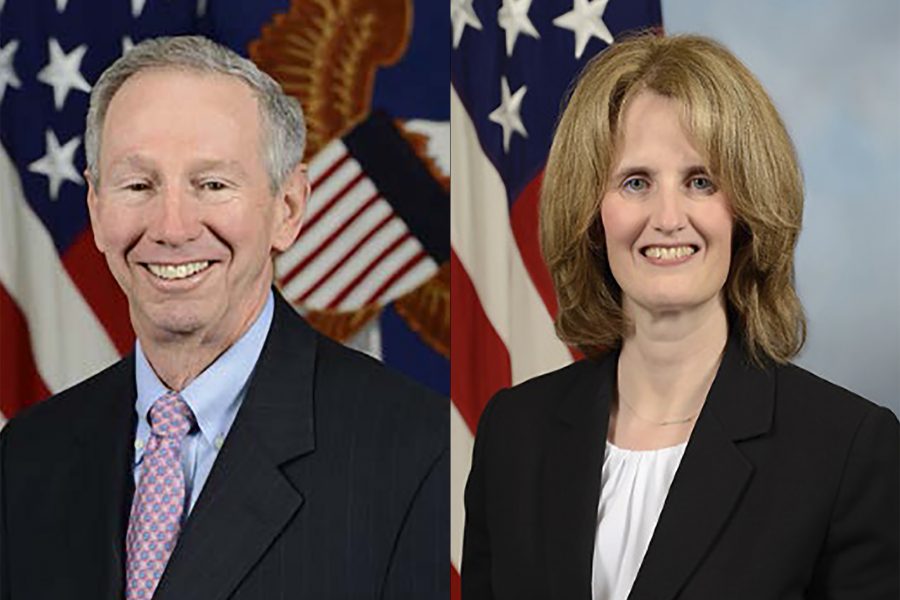Michael D. Griffin, the undersecretary of defense for research and engineering, and his deputy, Lisa Porter, are resigning their Pentagon jobs to take undisclosed positions with industry effective July 10, according to an email the two sent out to the R&E directorate June 23.
In the email, Griffin and Porter explained that a “private sector opportunity has presented itself to us, offering an opportunity we have decided to pursue together.” They did not disclose the nature of their new venture. They thanked their colleagues for three years’ worth of “diligence, integrity, and devotion to technical excellence and technical truth in furtherance of the R&E mission.”
It isn’t clear who will be the acting USD/R&E, the Pentagon’s fourth-highest-ranking position, if no one is appointed to succeed Griffin and/or Porter by July 10, and a Pentagon spokesman could not immediately comment. The R&E organization below Porter is comprised of non-Senate-confirmed Senior Executive Service appointees.
The USD/R&E organization was overhauled by Congress in 2016, in order to give the Pentagon a higher-level focus on rapidly advancing military technology and to curb risk-aversion. The post of undersecretary for acquisition, technology, and logistics was broken up into the post held by Griffin and that of undersecretary for acquisition and sustainment, held by Ellen Lord.
Griffin was the first to head the newly restructured R&E organization, which encompasses research and technology; modernization; advanced capabilities, and subsidiary units such as the Defense Advanced Research Projects Agency (DARPA), the Strategic Capabilities Office, Space Development Agency, and Missile Defense Agency.
Griffin, who was NASA administrator from 2005-2009 under President George W. Bush, has also headed the Space Department at the Johns Hopkins University Applied Physics Laboratory and was an executive vice president of Orbital ATK’s (now Northrop Grumman) Space Systems Group. Prior to becoming the USD/R&E, he was chairman and CEO of Schafer Corp., which provides professional services in national security, and he is the author of a textbook on spacecraft design.
He was also president and CEO of In-Q-Tel, where Porter was executive VP before coming to the Pentagon. Previously, she served as president of Teledyne Scientific and Imaging, and was the first director of Intelligence Advanced Research Projects Agency under the Director of National Intelligence. Porter, too, was a NASA alumni, having served as associate administrator for the aeronautics mission directorate.
Griffin famously began his tenure at the Pentagon declaring that hypersonics research was his “No. 1 priority” because of the lead enjoyed by China and Russia in that field. In April, however, Griffin’s modernization director, Mark J. Lewis, said at an AFA Mitchell Institute virtual event that the priority had changed, and microelectronics had displaced hypersonics as “our most important investment.” The shift reflected progress made in developing hypersonic systems in the last three years, Lewis said, while microelectronics are part of all weapon systems, and the Pentagon had become overly dependent on foreign sources.
The two resignations follow several high-level departures at the Pentagon in recent weeks. Kathryn Wheelbarger, the acting head of international security affairs, and Elaine A. McCusker, the acting Comptroller, both resigned last week after the White House declined to nominate them to permanent positions. McCusker had questioned the legality of blocking military aid to Ukraine, and Wheelbarger was closely associated with former Defense Secretary James N. Mattis and the late Sen. John S. McCain, both of whom were critics of President Trump. Deputy Inspector General Glenn A. Fine resigned effective June 1, soon after being pulled off an audit of the massive coronavirus relief package. Fine’s resignation letter lauded the role of Inspectors General as being essential to government transparency, checks, and balances.
